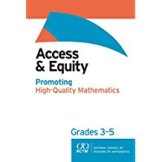
When I was at NCTM’s Annual Conference last month, I was surprised and excited to learn that my newest publication is now available. I cowrote this chapter with a doctoral student (Erin Smith) and an elementary teacher (Melanie Kremmel). The chapter focuses on strategies Melanie (a new teacher at the time) used when teaching mathematics with Oksana, a newly arrived emergent bilingual student from the Ukraine.
In this chapter we connect Ms. Kremmel’s experiences with Oksana to a broader conversation about the ways in which teachers facilitate the instruction of English learners in elementary grades. In particular, we focus on the ways in which Ms. Kremmel was able to broaden her notion of communication to build on the resources Oksana did have in English rather than focusing on those she did not have. In doing so, Ms. Kremmel was able to help Oksana further her understanding of both mathematics and language. (p. 69)
Along with our chapter, the book features chapters from many of my favorite mathematics educators. I hope you can check it out!
Citation
de Araujo, Z., Smith, E., & Kremmel, M. (2018). Moving the mathematics forward while acquiring English. In S. Crespo, S. Celedón-Pattichis, & M. Civil (Eds.), Access and Equity: Promoting high-quality mathematics in grades 3-5 (pp. 67-80). Reston, VA: National Council of Teachers of Mathematics.
Book Description (from NCTM’s website)
Edited by Sandra Crespo, Sylvia Celedón-Pattichis, and Marta Civil
Access and Equity: Promoting High-Quality Mathematics in Grades 3–5 examines the challenges related to access, equity, and empowerment faced by students making the critical transition into mathematics of the third through fifth grades. It provides guidance for making these essential improvements in practice:
- Finding ways to reframe common beliefs about nondominant students and communities
- Meeting the linguistic demands in mathematics classrooms for emerging bilingual students
- Adopting approaches that engage all students in mathematical discourse
- Implementing professional development that can make an impact with culturally and linguistically diverse students
The third through fifth grades are a crucial period when educational imbalances begin to take hold, as inequities in resources and expectations become more pronounced and significant. This book will help teachers provide a challenging, effective mathematics education for each and every student in those classrooms, and thus fully implement the Access and Equity Principle in NCTM’s Principles to Actions: Ensuring Mathematical Success for All.